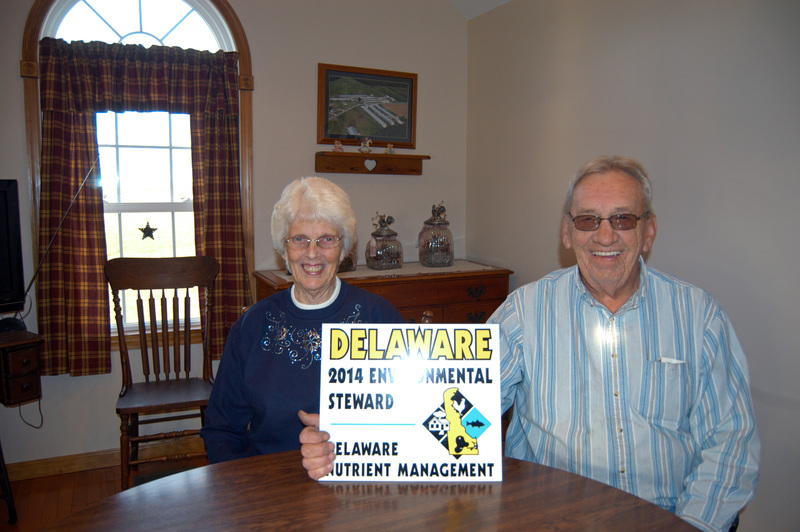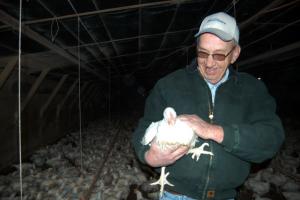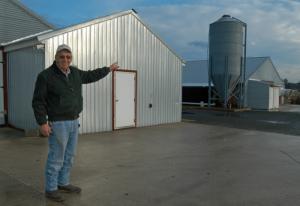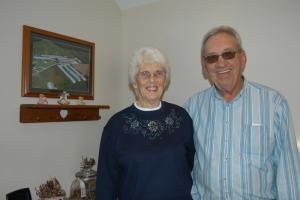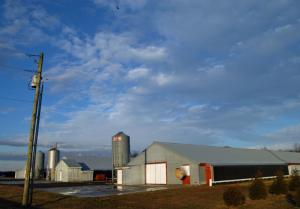Wesley Clifton: Millsboro farmer fondly remembers days past
A 9-to-5 office job was never in the cards for William “Wesley” Clifton.
The 68-year-old Millsboro poultry farmer says he couldn't imagine a life without farming.
“The poultry business is something I've always been around,” he said as he reflected on decades of producing food for the community.
Poultry farming runs in the Clifton family. Wesley was born above a chicken house in Dagsboro, in a time when living quarters were connected to where the chickens lived and ate. At that time, Wesley said, chicken houses had a feed room in the middle, with living quarters built above.
They weren't anything like today's chicken houses.
“Since I was a little kid, the industry has changed quite a bit,” he said, with a bit of southern twang in his voice. He sounds like a man born to be a farmer. “There was quite a bit more work back then,” he said. As a boy, Wesley would begin his mornings at 5 a.m., making sure coal heaters for his family and the chickens were working.
Wesley knew from an early age that he had a very important responsibility – a grueling job that needed attention early in the morning, and as soon as he got home from school each day. The young farmer-in-the-making used corn cobs to get the fire started. “You better be serious or you were constantly rebuilding the fire,” he said. “Now you just flip a switch.”
After school, he'd go right back to work alongside his mother, finishing their work by 7 or 8 p.m. Then he'd wash up, maybe do some homework, and rest for the day ahead.
“They'd let me do anything I'd want to do, anything that I was big enough to do,” he said.
Once a week, the family would go into town to the grocery store. He remembers the bread man and the milk man would swing by the house, long before big box stores.
It was a simple life, full of hard work. With his sweet smile and rough hands, Wesley says he wouldn't be the man he is today if he had lived his life any differently.
“It didn't ever cross my mind that I'd still be in the chicken business at my age,” he said. “I envisioned that 9-to-5 job, but I just never got away from those 16-hour days. I really enjoy what I do.”
Wesley lost his father, William, at a young age. His mother, Mattie Catherine, was a strong woman, he said, who worked hard to provide for her three children. After William's death in a tractor accident, Wesley had to take over as the man of the house. As an adult, has continued to focus on family as he continued his career in the poultry business.
When Wesley turned 18, he worked at the hatchery at Townsends Inc. He left there to work at General Foods in Dover, but after a couple of years he returned to Townsends. While working at Townsends, he and his wife, Mary, built three chicken houses. After working in the hatchery and grain divisions during a 34-year-long career at Townsends, the company was bought by Mountaire and Wesley left the company to start a new poultry venture with his wife.
Wesley and Mary are high school sweethearts who recently celebrated their 50th anniversary. Their years have been spent working together to raise their family and the tens of thousands of chickens that have passed through their chicken houses in the last 15 years.
They raise about 54,000 chickens at a time. The chicken houses are fully fitted with watering and feeding devices, as well as a control panel that Wesley said he could have upgraded so that he could change conditions in the houses without ever leaving his own home.
But that would be too boring, he says.
“Everything is automatic,” he said. “There's just not the manual labor involved. If there was more physical labor, I think more people would be thinking about getting out of it.”
A lot of things have changed about the poultry business, Wesley says. Instead of tending flocks for 22 weeks, they're ready to be shipped off by eight weeks. The chickens are larger, meatier birds, perfected through generations of breeding and vaccinations.
“They're super-chickens,” he said.
The biggest difference, he says, is in the size of the chicken houses. They're larger, he says; the equipment is more extensive and everything is automatic. When his parents tended flocks, they had to sterilize everything when the birds were shipped out, before they started over with a new batch of chicks. These days, water-borne or air-borne vaccinations make that unnecessary.
In those years of raising chickens from chicks to full-fledged birds, Wesley has handled millions of chickens. The Delaware native is a hard worker, but he credits his wife with keeping them afloat.
“My wife, she's really the chicken-raiser. I depend on her to take care of them when I'm not home. She really just saves the hard work that she can't handle for me,” he says with a rugged giggle.
Across the street from their cozy home, the smell of the chicken houses is evident before one enters the long, modern-looking building. Inside, among about 17,000 birds, it's warm and dusty. Bursts of cold winter air swirl thousands of fluffy white feathers around the chickens before settling to the ground like a coating of snow.
The Cliftons agree that it can be a dirty, smelly job.
“But it gives you a reason to get up in the morning,” Mary Clifton said. “I don't know what I'd do without it.”
After 50 years of marriage and decades as poultry farmers, Mary and Wesley agree that their secret to success is understanding that there has to be give and take – and plenty of hard work.
The Cliftons are starting to talk about retirement, but they both agree that they wouldn't know what to do with their time if they give up raising chickens. They're toying with the idea of retiring from the business in five years, but Wesley says he expects he'll miss it.
“But I don't think I'll quit completely,” Wesley says. “It's a way of life. It's a fact of life.”














